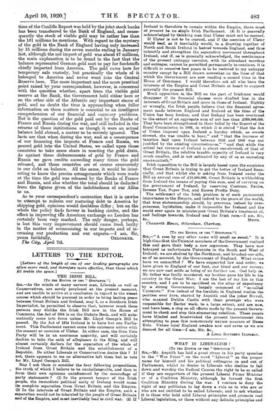LETTERS TO THE Eprrou.
[Letters of the length of one of our leading parapraphs are often more read, and therefore more effective, than those which fill treble the space.]
TIM IRISH BILL.
[To THE. EDITOR Or THE " IIPECTATOR."] BM—As the minds of many earnest men, Liberals as well as Conservatives, are sorely perplexed at the present moment, and are unable to arrive at a conclusion in regard to the wisest course which should be pursued in order to bring lasting peace between Great Britain and Ireland, may I, as a Southern Irish Imperialist, be permitted to observe that, however much these persons may dislike the Irish Bill now in the House of Commons, the Act of 1914 is on the Statute Book, and will auto- matically come into force unless Mr. Lloyd George's Bill be passed. By the Act of 1914 Ireland is to have but one Parlia- ment. This Parliament cannot come into existence unless with the consent or coercion of Ulster. In either case, the Sinn Fein Party will be in an enormous majority, and will certainly decline to take the oath of allegiance to the King, and will almost certainly declare for the separation of the whole of Ireland from Great Britain and the establishment of a Republic. Do either Liberals or Conservatives desire this ? If not, there appears to me no alternative left them but to vote for Kr. Lloyd George's Bill.
May I ask them to eonsider the four following propositions, the truth of which I believe to be unchallengeable, and then to form their own opinions uninfluenced by the camouflage of party statements ? (1). In the present temper of the Yrish people, the immediate political unity of Ireland would mean its eomplete separation from Great Britain and the Empire. (2) In the interests of Great Britain and the Empire, such a separation would not be tolerated by the people of Great Britain and of the Empire, and must inevitably lead to civil war. (3) If Ireland is therefore to remain within the Empire, there must at present be no single Irish Parliament. (4) It is generally acknowledged by thinking men that Ulster must not be coerced.
If Ulster is not to be coerced, and if the coercion of Ulster would lead, as it inevitably would, to a drawing together of North and South Ireland in hatred towards England, and thus intensify and strengthen the separation movement throughout Ireland, and if, as is generally acknowledged, the continuance of the present unhappy. coercion, with its attendant murders and outrages, cannot be permitted permanently to continue, it is difficult to cottony* how peace is to be restored to my unhappy country except by a Bill drawn somewhat on the lines of that which the Government are now reading a second time in the House of Commons. I would therefore ask all who have the interests of the Empire and Great Britain at heart to support generally the present Bill.
Much- opposition to the Bill on the part of Irishmen would' disappear if its financial clauses were drafted less in the interests of GreatBritain and more in those of Ireland. Rightly or wrongly, the Irish people believe that the financial agree- ment made between England and Ireland at the time of the Union has been broken, and that Ireland has been overtaxed to the extent of an aggregate sum of not leas than X300,000,000. They have been strengthened in their belief by the Report of the Royal Commission in 1896, in which it is stated "that the Act of Union imposed upon Ireland a burden which, as events showed, she was unable to bear," and " that the increase of taxation laid upon Ireland between 1853 and 1860 was not justified by the existing circumstances," " and that while the actual tax revenue of Ireland is about one-eleventh of that of Great Britain, the relative taxable capacity of Ireland is very much smaller, and Is not estimated by any of us as exceeding one-twentieth."
Irish opposition to the Bill is largely based upon the suspicion that Great Britain is trying to get the better of Ireland finan- cially, and that whilst she is asking from Ireland under the Bill an annual sum of 1:18,000,000, Great Britain is withholding from Ireland the means of paying this sum, and of carrying on the government of Ireland, by reserving Customs, Excise, Income Tax, Super Tax, and Excess Profits Duty.
The settlement of the Irish problem is of each paramount importance to the Empire, and indeed to the peace of the world, that true statesmanship should, by generous, indeed by over- generous, legislation, make it impossible for Ireland and the world ever again to misinterpret Great Britain's treatment of, and feelings towards, Ireland and the Irish race.—I am, Sir, Chaworth House, Ottcrshaw, Chertseg.


































 Previous page
Previous page